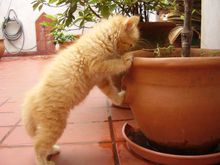
Curiosity killed the cat
Encyclopedia

Proverb
A proverb is a simple and concrete saying popularly known and repeated, which expresses a truth, based on common sense or the practical experience of humanity. They are often metaphorical. A proverb that describes a basic rule of conduct may also be known as a maxim...
used to warn of the dangers of unnecessary investigation or experimentation. A less frequently-seen rejoinder to "curiosity killed the cat" is "satisfaction brought it back".
The original form of the proverb, now little used, was "Care killed the cat". In this instance, "care" was defined as "worry" or "sorrow."
Origin
The earliest printed reference to the original proverb is attributed to the BritishGreat Britain
Great Britain or Britain is an island situated to the northwest of Continental Europe. It is the ninth largest island in the world, and the largest European island, as well as the largest of the British Isles...
playwright
Playwright
A playwright, also called a dramatist, is a person who writes plays.The term is not a variant spelling of "playwrite", but something quite distinct: the word wright is an archaic English term for a craftsman or builder...
Ben Jonson
Ben Jonson
Benjamin Jonson was an English Renaissance dramatist, poet and actor. A contemporary of William Shakespeare, he is best known for his satirical plays, particularly Volpone, The Alchemist, and Bartholomew Fair, which are considered his best, and his lyric poems...
in his 1598 play, Every Man in His Humour
Every Man in His Humour
Every Man in His Humour is a 1598 play by the English playwright Ben Jonson. The play belongs to the subgenre of the "humours comedy," in which each major character is dominated by an overriding humour or obsession.-Performance and Publication:...
, which was performed first by William Shakespeare
William Shakespeare
William Shakespeare was an English poet and playwright, widely regarded as the greatest writer in the English language and the world's pre-eminent dramatist. He is often called England's national poet and the "Bard of Avon"...
.
Shakespeare used a similar quote in his circa 1599 play, Much Ado About Nothing
Much Ado About Nothing
Much Ado About Nothing is a comedy written by William Shakespeare about two pairs of lovers, Benedick and Beatrice, and Claudio and Hero....
:
The proverb remained the same until at least 1898. Ebenezer Cobham Brewer
Ebenezer Cobham Brewer
The Reverend Dr. Ebenezer Cobham Brewer , was the compiler of Brewer's Dictionary of Phrase and Fable, and The Reader's Handbook, Victorian reference works.-Education and travels:E...
included this definition in his Dictionary of Phrase and Fable:
Transformation
The origin of the modern variation is unknown. The earliest known printed reference to the actual phrase "Curiosity killed the cat" is in James Allan Mair's 1873 compendium A handbook of proverbs: English, Scottish, Irish, American, Shakesperean, and scriptural; and family mottoes, where it is listed as an Irish proverb on page 34.In the 1902 edition of Proverbs: Maxims and Phrases, by John Hendricks Bechtel, the phrase "Curiosity killed the cat" is the lone entry under the topic "Curiosity" on page 100.
O. Henry
O. Henry
O. Henry was the pen name of the American writer William Sydney Porter . O. Henry's short stories are well known for their wit, wordplay, warm characterization and clever twist endings.-Early life:...
's 1909 short story "Schools and Schools" includes a mention that suggests knowledge of the proverb had become widespread by that time:
The actual phrase appeared as the headline to a story in The Washington Post
The Washington Post
The Washington Post is Washington, D.C.'s largest newspaper and its oldest still-existing paper, founded in 1877. Located in the capital of the United States, The Post has a particular emphasis on national politics. D.C., Maryland, and Virginia editions are printed for daily circulation...
on 4 March 1916 (page 6):
Despite these earlier appearances, the proverb has been widely attributed to Eugene O'Neill
Eugene O'Neill
Eugene Gladstone O'Neill was an American playwright and Nobel laureate in Literature. His poetically titled plays were among the first to introduce into American drama techniques of realism earlier associated with Russian playwright Anton Chekhov, Norwegian playwright Henrik Ibsen, and Swedish...
, who included the variation, "Curiosity killed a cat!" in his play Diff'rent from 1920:
The author Stephen King
Stephen King
Stephen Edwin King is an American author of contemporary horror, suspense, science fiction and fantasy fiction. His books have sold more than 350 million copies and have been adapted into a number of feature films, television movies and comic books...
has used an extended variation of this idiom in several of his novellas: "Curiosity killed the cat, satisfaction brought him back".
External links
- "Curiosity Killed The Cat" at GoEnglish.com (with illustration)
- Henry, O. Schools and Schools. (Gutenberg text)
- Jonson, Ben. Every Man in His Humour. (Gutenberg text)
- O'Neill, Eugene. Diff'rent. (Gutenberg text)
- Shakespeare, William. Much Ado About Nothing. (Gutenberg text)
- Brewer, E. Cobham. Dictionary of Phrase and Fable.
- Mair, J.A. (ed.). A handbook of proverbs: English, Scottish, Irish, American, Shakesperean, and scriptural; and family mottoes.

